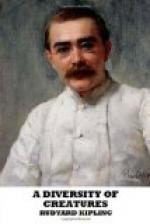’Yet even with their tall, grief-declaring bearskins, the Granadeers could not endure the full hour’s guard in the Presence. There was good cause, as I will show, why no man could endure that terrible hour. So for them the hour’s guard was cut to one-half. What did it matter to the Sahibs? They could draw on ten thousand Granadeers. Forsyth Sahib, who had comprehension, put this choice also before the four, and they said, “No, ours is the Honour of the Armies of Hind. Whatever the Sahibs do, we will suffer the full hour.”
’Forsyth Sahib, seeing that they were—knowing that they could neither sleep long nor eat much, said, “Is it great suffering?” They said, “It is great honour. We will endure.”
’Forsyth Sahib, who loves us, said then to the eldest, “Ho, father, tell me truly what manner of burden it is; for the full hour’s watch breaks up our men like water.”
’The eldest answered, “Sahib, the burden is the feet of the multitude that pass us on either side. Our eyes being lowered and fixed, we see those feet only from the knee down—a river of feet, Sahib, that never—never—never stops. It is not the standing without any motion; it is not hunger; nor is it the dead part before the dawn when maybe a single one comes here to weep. It is the burden of the unendurable procession of feet from the knee down, that never—never—never stops!”
’Forsyth Sahib said, “By God, I had not considered that! Now I know why our men come trembling and twitching off that guard. But at least, my father, ease the stock a little beneath the bent chin for that one hour.”
’The eldest said, “We are in the Presence. Moreover He knew every button and braid and hook of every uniform in all His armies.”
’Then Forsyth Sahib said no more, except to speak about their parched grain, but indeed they could not eat much after their hour, nor could they sleep much because of eye-twitchings and the renewed procession of the feet before the eyes. Yet they endured each his full hour—not half an hour—his one full hour in each four hours.’
‘Correct! correct!’ said the Subadar-Major and the Chaplain together. ‘We come well out of this affair.’
‘But seeing that they were old men,’ said the Subadar-Major reflectively, ’very old men, worn out by lack of food and sleep, could not arrangements have been made, or influence have been secured, or a petition presented, whereby a well-born Sikh might have eased them of some portion of their great burden, even though his substantive rank—’
‘Then they would most certainly have slain me,’ said the Havildar-Major with a smile.
‘And they would have done correctly,’ said the Chaplain. ’What befell the honourable ones later?’
’This. The Kings of the earth and all the Armies sent flowers and such-like to the dead King’s palace at Wanidza, where the funeral offerings were accepted. There was no order given, but all the world made oblation. So the four took counsel—three at a time—and either they asked Forsyth Sahib to choose flowers, or themselves they went forth and bought flowers—I do not know; but, however it was arranged, the flowers were bought and made in the shape of a great drum-like circle weighing half a maund.




